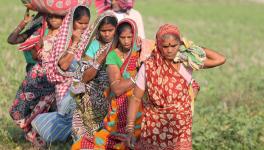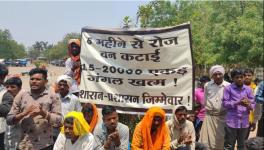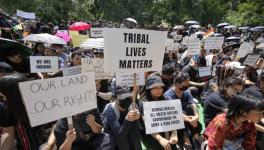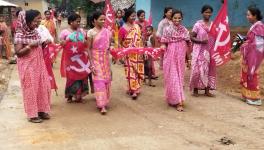How International Law Can Stop Eviction of Millions of Indian Tribals
Image for representational use only.Image Courtesy : The Indian Wire
On February 13, 2019 a three-judge bench of the Supreme Court delivered an order in a Public Interest Litigation (PIL) filed by select non-governmental wildlife organisations, associations of retired forest bureaucrats and former zamindars. The PIL challenged the constitutionality of the Forest Rights Act, 2006 (FRA). The ground for challenge was that the Act facilitates deforestation and illegal encroachment of forest land and thus impedes the objective of preservation of the forests.
The order directed state governments to evict all people by July 24, whose claims over traditional forest lands had been rejected. The number of such people is approximately 10 lakh. The court also asked state governments to explain the reason for non-compliance of its order, if it has not been complied with.
Taking note of the order, the Campaign for Survival and Dignity highlighted the matter, and the journalist Nitin Sethi broke the news, which led to a public uproar. Thereafter, the central government through the Solicitor General, asked the court to take a “holistic view” of the matter in the larger interest of forest dwellers. Consequently, the Court stayed its errant order and gave state governments time until July to respond to the question of unlawful rejection of claims.
After the SC’s overzealous attempt to monitor and classify citizens as “illegal migrants” in the NRC case, the present PIL is another example of diluting established legal procedures and protections. During the hearings, no representation was made by the tribals who are sought to be evicted. They continued to be labelled as “encroachers” rather than rights-bearing individuals.
Interestingly, the petitioners in the case had not even sought the eviction of tribals in their petition before the court. However, as highlighted by scholars such as Anuj Bhuwania, the flexibility of the PIL jurisdiction allows the Supreme Court to exercise its expansive powers to shift the cause of action and issue remedies.
The FRA, a central legislation, recognises the rights of indigenous populations over forests as their source of livelihood and their right to reside in forestlands. This was an attempt to undo years of injustice and invisibilisation of tribal rights over their lands and forests. Through this Act, the power to manage and govern the forestland was awarded to gram sabhas. Their supremacy in giving consent to any activity, including development projects and plantation schemes on forest lands, even by governments, was affirmed in 2013 by the Supreme Court in the historic Vedanta Mining Project judgement.
Eviction would undo the hard-won recognition of the historical ties that tribals have to forests. It would render them homeless, landless, poor and destitute. There is no evidence to support the claims that forestland and green cover is depleted by tribals. In fact, tribals have lived in forest lands harmoniously for decades and contribute to their sustenance.
Forced Eviction and International Law Obligations
According to Census 2011, approximately 8.6% of the population is Scheduled Tribe, that is, indigenous. However, India has a chequered past in recognising the rights of its indigenous population under international laws. Officially, India rejects the equating of tribals as indigenous. In fact, the entire Indian population is considered indigenous despite constitutional recognition given to Scheduled Areas and Tribal Areas.
Forced eviction under international law means, “permanent or temporary removal against their will of individuals, families and/or communities from the homes and/or land which they occupy, without the provision of, and access to, appropriate forms of legal or other protection,” according to the United Nations International Covenant on Economic, Social and Cultural Rights or ICESCR.
Although India does not automatically incorporate international law within its domestic law, the Supreme Court has evolved the application of international legal norms in practice over the years. Human rights and the environment, in particular, have been incorporated within the fundamental rights regime in India. The ratification of the International Covenant on Civil and Political Rights (ICCPR, 1974) and the International Covenant on Economic, Social and Cultural Rights (ICESCR, 1984) is significant in this context; for not only did the Indian state undertake the obligations that flow from these treaties but also commits to not take any action that goes against their objects and purpose. Further, both conventions have been domesticated by the Protection of Human Rights Act, 1993.
In Vishaka v. State of Rajasthan, 1997, the Supreme Court held that any international convention or customary international law that is not repugnant to fundamental right must be read into the constitutional scheme. Thus, obligations such as the rights to life and security, adequate standard of living (including housing, food, water and sanitation) which are non-derogable rights in the ICCPR, apply to the Indian state. These rights are read within the Part III of the Constitution, dealing with fundamental rights.
In particular, Article 12 of the ICCPR, establishes the “right to liberty of movement and freedom to choose residence”, which includes the right not to be moved from one’s place. Additionally, persons forcibly transferred from their homes are entitled to the “right to return”, which has become customary international law.
Forced evictions often result in unsafe passage and subject people to violence and discrimination. Even internal movement of people can make them victims of inhumane treatment. This may constitute torture under customary law (as India has not ratified the UN Convention against Torture). Moreover, women and girls are rendered vulnerable, especially to sexual violence, during and after evictions. It is worth noting in this context that India ratified the Convention on the Elimination of all Forms of Discrimination Against Women (CEDAW) in 1993.
A recent decision of a division bench of the Delhi High Court in Ajay Maken & Ors. v. Union of India, 2019 recognised forced eviction as a violation of international law. It affirmed the procedural safeguards that are applicable to such evictions: genuine consultation, adequate and reasonable notice for affected persons, and legal remedies including legal aid to those who need it in order to seek redress from the courts.
Without any clear directive by central or state authorities with respect to resettlement, rehabilitation and compensation, the future of millions of tribals looks bleak. Forceful eviction will change the status of tribals to internally displaced persons. It will hamper their liberty, dignity and security, which the law is meant to protect. Further, the right to effective remedy and access to justice, recognised under the Constitution and international human rights law (IHRL) stands diluted. This is because the central government did not defend their rights before the apex court. This has shifted the burden to defend their rights and titles on to the poor and marginalised communities. Imposing such an onerous burden further violates due process.
The inordinate delay of 11 years in deciding the constitutionality of the FRA highlights the procedural abuse and systemic injustice that is meted out to vulnerable groups. Lawyer Gautam Bhatia noted recently: “But in the last year, we have seen something else. We have seen cases where the issue is not whether the Court correctly exercised judgment in a contest between the individual and the State, but where the Court itself became an aggressor against fundamental rights. Against that aggression, as we have also seen, there is neither recourse nor appeal. And when that happens, it is long past time to take a step back, and to take a long, hard look at the path we are on, and to ask where it will take us.”
The ongoing case differs from other instances of internal displacement because here the violation of human rights would stem from a decision of the Supreme Court. The forced eviction of the tribals would violate human rights obligations in the manner in which they will be evicted and, in its consequences, as also in how the decision to evict is taken and planned. Thus, the SC-monitored and -ordered eviction violates the Indian state’s obligations under international law.
International law views the state and its organs as one. Any action of legislature, executive or judiciary, if they go against a treaty or customary international law, attract international state responsibility. Thus, the fact that the central government’s legal team was absent during their hearing, even though the challenge was to a central legislation, is relevant: The burden to raise the defence of presumption of constitutionality rests, after all, on the government.
Further, even assuming that the Supreme Court goes ahead with the order to evict after hearing the petitions filled by the adivasi women, the Indian government still retains the power to reverse its effects. Should the government decide against reversing it, India’s responsibility will be attracted under international law, as it will amount to the state’s omission to abide by its international obligations.
A wrongful act can be attributed to the state if any of its organs (in this case, judiciary) violates an obligation. This principle is codified in Article 4 of the International Law Commission’s Articles on the Responsibility of States for Internationally Wrongful Acts. The principle was accepted by the International Court of Justice in Cumaraswamy, 1999, where it was held that the “conduct of an organ of a state—even an organ independent of executive power—must be regarded as an act of that state”.
The argument that a state cannot be held responsible for the independent exercise of judicial power by an organ over which it has no control, wrongly projects the means as its ends. In other words, judicial independence is not an end in itself but a means to protect and safeguard judicial thought and, as a consequence, sound administration of justice. Further, it would be immaterial whether the international wrongful act is designated as lawful in the domestic law of the state.
It has to be seen whether the Supreme Court will redeem itself by upholding the constitutionality of the FRA and stop the eviction of tribals en masse. Any way you look at it, the buck stops with the court.
Aakash Chandran is a LLM candidate studying international law at the South Asian University, New Delhi. The views are personal.
Get the latest reports & analysis with people's perspective on Protests, movements & deep analytical videos, discussions of the current affairs in your Telegram app. Subscribe to NewsClick's Telegram channel & get Real-Time updates on stories, as they get published on our website.
























